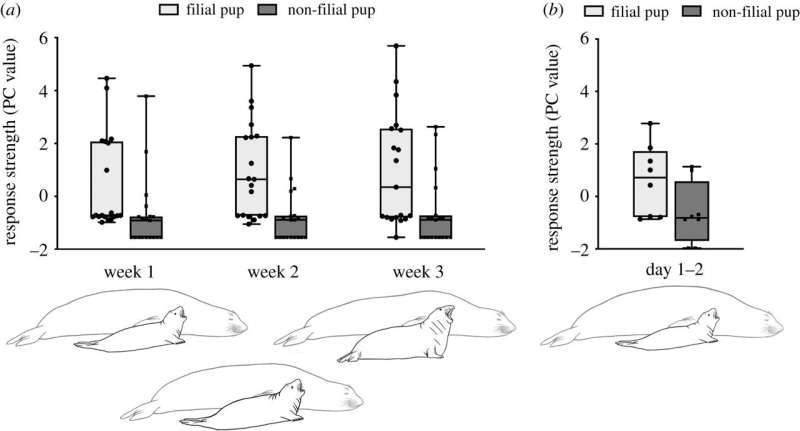December 23, 2021 report
Mother elephant seals able to recognize their pup's voice just two days after giving birth

A team of researchers from the University of California's Institute of Marine Sciences, Institut des Neurosciences Paris-Saclay and the University of Lyon has found that mother elephant seals are able to distinguish their own pups' voices just two days after giving birth. In their paper published in the journal Biology Letters, the group describes their study of a colony of the seals.
Elephant seal colonies are notoriously loud in the late fall after mothers give birth to pups—both mothers and pups regularly call out to keep track of each other. In this new effort, the researchers wondered how the mothers were able to communicate with their own pups amid so much chatter from other mothers and their pups. They also wondered why new mothers sometimes nursed pups that were not theirs.
To learn more about the bond between mother elephant seals and their newly born offspring, the researchers set up microphones near and amid a herd of elephant seals in a colony on a beach in Southern California. They also set up little remote speakers that allowed them to play recorded pup calls.
In studying their recordings and playing some of them back to mothers in the herd, the researchers found that the mothers were able to recognize the calls made by their own offspring within two days of giving birth to them. That recognition ability, the researchers found, was strong enough to allow the mothers to distinguish between calls from their own pups and those from other pups nearby.
The researchers noted that while nursing, the mothers fasted, losing up to half their body weight before the pups were able to eat other food. That high cost made them wonder why the mothers would be willing to feed other pups when they came asking for a meal. The team was not able to find any evidence to explain it, but note that elephant seals were nearly wiped out by humans in the 1800s, which means that the animals that exist today are all closely related. Thus, all the pups in a colony are very similar to one another, genetically speaking, which may confuse mothers at times—or they may simply be willing to feed extended family.
More information: Juliette Linossier et al, Maternal responses to pup calls in a high-cost lactation species, Biology Letters (2021). DOI: 10.1098/rsbl.2021.0469
Journal information: Biology Letters
© 2021 Science X Network

















